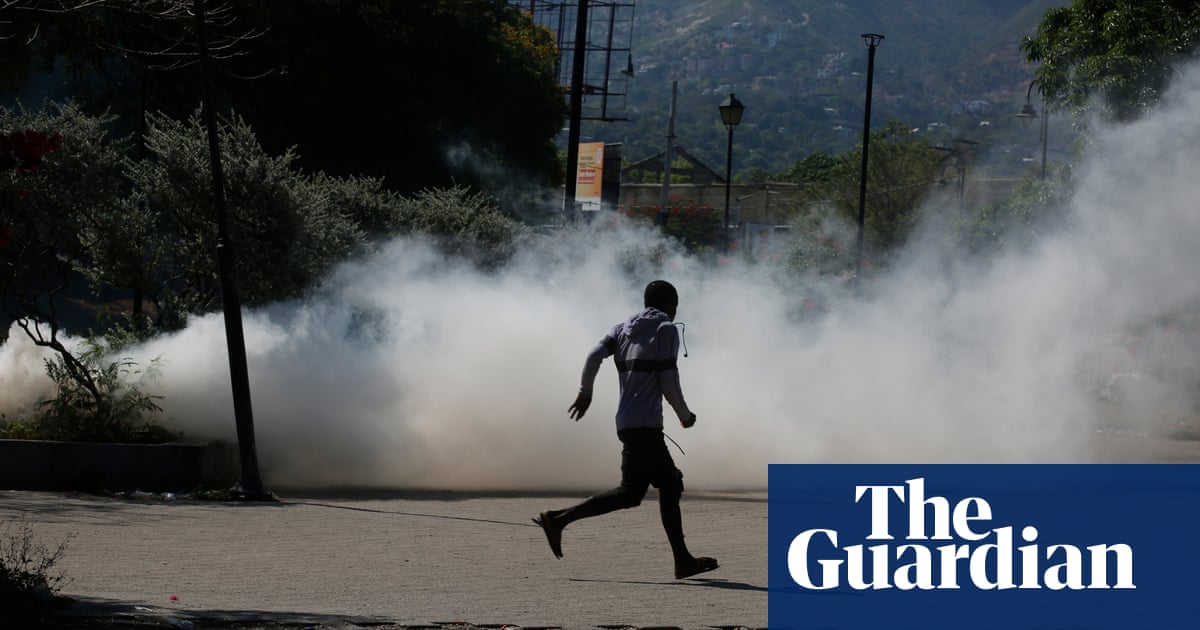
The UN’s top expert on human rights in Haiti has warned the Caribbean country is rapidly moving towards becoming “like Somalia in the worst of its times” after a criminal uprising which has displaced tens of thousands of people and largely cut its capital city off from the world.
Just over a month after the gang rebellion began, William O’Neill – an American human rights lawyer who has been travelling to Haiti for more than 30 years – voiced alarm over the rapidly deteriorating situation in Port-au-Prince.
The international airport has been closed since early March because of the violence, foreigners are being evacuated by helicopter, and heavily armed gang fighters continue to sow chaos, launching almost daily attacks on schools, universities, hospitals, banks, businesses and the political heart of the Haitian capital. On Wednesday, the national library was looted.
“I know someone who lost half her family to [former dictator] François Duvalier’s execution squads and she said she’s never seen it this bad. Uncles, cousins, brothers killed – and she said it’s never been this bad,” O’Neill said from Geneva.
“I’m running out of words frankly at this point … it’s apocalyptic, it’s like the end of times,” added the UN’s independent expert, who helped set up the resource-starved Haitian police force that is now battling to stem the tide in the mid-1990s. “[There’s] a level of intensity and cruelty in the violence that is simply unprecedented in my experience in Haiti.”
More than 1,500 people have been killed in the first three months of 2024, compared with 4,451 in the whole of last year, the UN said last week.
O’Neill is no stranger to challenging security situations, having worked in hotspots including Rwanda, Sierra Leone, Kosovo, Bosnia, Nepal and South Sudan. But he expressed shock at the almost complete evaporation of Haitian authorities in the face of the gang mutiny, which started on 29 February and forced the prime minister, Ariel Henry, to announce his resignation from abroad. Haiti held its last election in 2016 and has lacked a president since 2021 when Jovenel Moïse was assassinated in his Port-au-Prince home. Haiti currently has no elected officials.
“Here, I think what’s different is that the state is virtually absent … There is no state and that’s almost like a Hobbesian world where it’s really the survival of the fittest … and unfortunately the fittest right now are the gangs,” said O’Neill, who thought only a minor miracle was helping Haiti’s outgunned police prevent a total takeover.
So far the bulk of the violence has been confined to Port-au-Prince, up to 90% of which is now estimated to be controlled by Haiti’s powerful, politically connected gangs. More than 53,000 people have fled the capital in recent weeks, according to the UN.
However, O’Neill feared the turmoil could soon engulf other parts of the country, fuelling a massive exodus of refugees to the US and Dominican Republic, which shares the island of Hispaniola with Haiti. “If it all just completely goes hell in a handbasket and it spreads out of Port-au-Prince to the countryside … [you’ll have] lots of people getting on boats. You’re gonna see [them] … take whatever risk to get out of there.”
O’Neill believed that nightmarish scenario was “weeks [away] at worst, months at best”. “It’s really now descending into something that’s like Somalia in the worst of its times, a 90-minute flight from Miami. We’re not there yet. But we’re perilously close.”
Despite his grim prognosis, O’Neill believed the situation could be reversed. He hoped a Kenya-led multinational “security support mission” of up to 4,000 police officers and troops would be deployed and manage to retake and secure key pieces of infrastructure such as the airport, the port and the fuel terminal.
The upcoming US election meant the Biden administration was unlikely to send troops. But the UN expert believed Washington could severely disrupt the gangs by cracking down on the smuggling of US-made weapons from Florida to Haitian ports.
“I’m amazed that you can’t get food or medicine into Haiti, but you still get guns and bullets coming in … I can’t believe my government can’t inspect those boats leaving from the Miami River and pull out every rifle and bullet because Haiti doesn’t produce any guns or bullets,” O’Neill said, adding: “If the gangs don’t have their guns or bullets, they lose all their power.”
Gang propaganda videos posted on social media in recent weeks have offered a chilling glimpse of their firepower and drawn comparisons with Mexico’s bellicose drug cartels.
Observers continue to debate the precise motives driving the mafia insurrection, which one limelight-seeking gang spokesperson has painted as a popular revolution against Haiti’s corrupt elites.
O’Neill suspected the rebellion was not about seizing power but rather deterring the deployment of foreign security forces and intimidating politicians involved in a transitional council being set up to choose new leaders and restore order. He said Haiti’s almost total lack of government was essential to the gangs’ lucrative illegal activities including kidnapping, gun-running, drug trafficking and extortion.
“I can’t read their minds but it seems as though they’re targeting people or institutions that could be involved in a change – a transition from this catastrophe to something different … They’re not interested in changing Haitian society or good governance or anything like that,” O’Neill said of the gangs.
“I don’t think they want to take over … This is not like the Maoists in Nepal or [Colombia’s] Farc. There’s no ideology here to take over the state and run things. I think they want to keep a very weak, ineffective and largely absent state so that they can fill the void and keep control.”